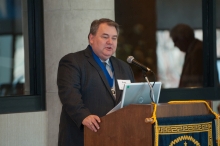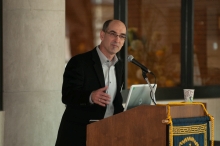2015 Annual Initiation Ceremony

The 2015 MSU Chapter 041 Annual Initiation Ceremony and Banquet was held on April 18, honoring 88 years at MSU. A total of 42 new members were initiated. Theresa Kaminski was this year's National Graduate Fellowship Nominee.
View Initiation Ceremony program
Invited Presentation

"It Takes Two to Rumba: Bridging the Divide Between the U.S. and Cuba"
Ricardo Lorenz, Associate Professor and Chair of Music Composition College of Music, Michigan State University
In a recent issue of Time Magazine, correspondent Karl Vick attempts to predict the future in his feature article "Cuba: What will Change when the Americans Arrive." The truth, according to MSU Associate Professor Ricardo Lorenz, is that Americans have already arrived in Cuba through study abroad and academic exchange programs across the country like the one he has co-led since 2012. Professor Lorenz will share his experience taking students, artists, and scholars back and forth between the U.S. and Cuba and will argue that, despite the 1959 socialist revolution, in spirit the U.S. never left Cuba. Likewise, Cuba has only grown larger in the imagination of Americans during the last half-century. This is especially evident when one studies the music of both countries. The relationship between the two cultures, Lorenz explains, has been and will continue to be symbiotic despite the intense political drama. He cautions, however, that if not managed thoughtfully, the ongoing changes could cause a reversal of the recent improvement of relations between the two countries.
New Initiates
In accordance with national standards for membership in Phi Kappa Phi, student candidates must have completed 24 semester hours, or the equivalent, at Michigan State University. Students are selected from the upper 10% of the senior class; the upper 7.5% of students with junior standing upon completion of 72 hours; and graduate or professional students who rank in the upper 10% of all enrolled graduate students at Michigan State University.
In addition to students, the Chapter is permitted to elect annually a small number of outstanding faculty, professional staff, and alumni chosen on the basis of academic record, professional achievements, and service to higher education. These persons are nominated by chapter members and, as with the student candidates, are discussed and voted on by the members. The Chapter is also permitted to nominate persons for distinguished and honorary memberships. These prestigious distinctions require the review and approval of the Society's national Board of Directors.
View List of 2015 Initiates
View Gallery of 2015 New Initiates
Thumbnail images will open up into high resolution images for download.
2015 Excellence Award in Interdisciplinary Scholarship Recipient
The MSU Chapter's "Excellence Award in Interdisciplinary Scholarship" recognizes the outstanding interdisciplinary work of scholarly teams, in teaching, research, service, or a combination of these activities. This year's award recognizes Promoting Inclusive, Ethical, and Successful STEM Teams.
Many of the common expectations, or norms, of today's science disciplines were developed during a time that was very different from today. Because science practices are rapidly changing, so too are these norms. The faculty team receiving this year's Excellence Award in Interdisciplinary Scholarship studies four important areas of change: (1) How 'big data' is changing the culture and norms of environmental science; (2) How data-sharing facilitates an inclusive STEM culture; (3) How diversity within STEM teams contributes to ethical behaviors; and (4) How the next generation of environmental scientists can be trained for success in interdisciplinary, team-based, data-intensive research.
The themes of interdisciplinarity and diversity apply both to the research team and to the outcomes that it is studying and promoting. The team consists of two environmental scientists (Kendra Spence Cheruvelil and Patricia Soranno), a psychologist (Isis Settles), a historian (Georgina Montgomery), a philosopher (Kevin Elliott), and a computer scientist (Pang-Ning Tan). Four team members are women, and two are scholars of color. Collectively they span the College of Agriculture and Natural Resources (KC, KE, PS), the College of Social Science (IS, GM), the College of Engineering (PNT), and the Lyman Briggs College (KC, KE, GM), and have begun to work with new collaborators in the MSU Libraries.
To date, this team has published an influential paper in BioScience and received a $600,000 grant from the National Science Foundation, as well as an internal grant from MSU's Science Studies at State program. It is currently writing a paper on changing norms in response to the rise of big-data science, and is developing new grant proposals to the National Science Foundation and the Sloan Foundation. Given the increasing number of scientific projects that incorporate interdisciplinary teams and big-data methodologies, these research efforts have the potential to play a significant role in emerging and future scientific practice.
2015 Phi Kappa Phi National Graduate Fellowship Nominee
Every year, the Honor Society of Phi Kappa Phi awards fifty-one Fellowships of $5,000 each and six at $15,000 each to members entering the first year of graduate or professional study. Each Phi Kappa Phi chapter may select one candidate from among its local applicants to compete for the Society-wide awards.
Theresa Kaminski is a senior at Michigan State University, majoring in genomics and molecular genetics with a minor in Spanish. Kaminski's desire to pursue medicine originally began when she volunteered on a medical mission trip to Antigua, Guatemala. To further her medical experience she has accumulated over 1,000 direct patient care hours as a nursing assistant, while also studying the progression of metastasis in triple negative breast cancer as a research assistant. Currently she is interning at St. John's Catholic Church and Student Center in East Lansing to educate people about Christianity and to assist them in joining the Church. Kaminski is deciding between multiple medical school acceptances at Michigan State University, Wayne State University, and Loyola University. Her desires for the future involve becoming a medical professor and starting a nonprofit organization focused on implementing sustainable medicine in underserved communities.
